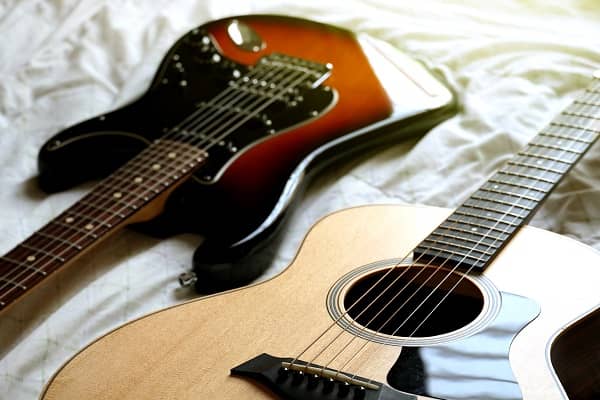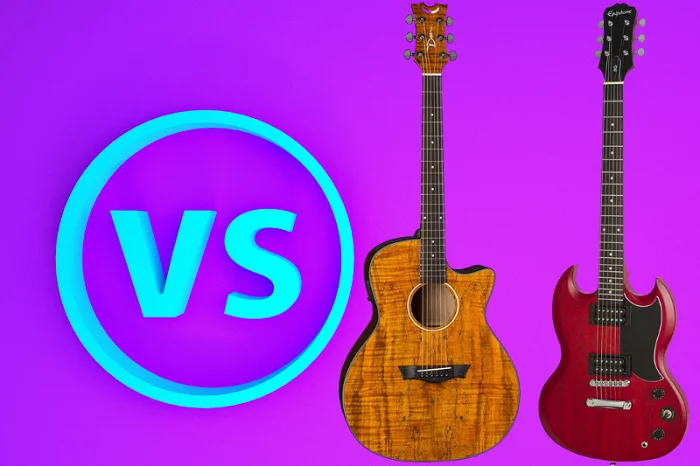So, you’ve decided to buy your first guitar. Maybe this is your initial step to becoming a musician, or perhaps this will be a second instrument for you. Either way, you’re naturally trying to decide whether you’ll be learning acoustic vs electric guitar.
It’s a decision that every aspiring guitarist has to make. There really is no universal right or wrong answer. Stick with me and keep reading to get some basic information to help you make your choice.
Here are some key points we’ll cover in this article:
- Understanding the two instruments.
- Similarities and differences between them.
- The Pros and cons of each instrument.
- Which is easier to play for beginners?
Understanding Acoustic and Electric Guitars
When trying to decide between an electric or acoustic guitar, it’s good to have some basic knowledge of each instrument.

Acoustic Guitar Overview
Acoustics are generally made of all wood, though some use carbon fiber or even plastics for part of their construction. The type and quality of the wood will have a major effect on the tone of the instrument.
Sound is produced by the string vibrations being transferred into the bridge and the top of the guitar. The sound resonates throughout the interior of the guitar’s body and finally comes out of the sound hole.
Acoustic guitars come in a variety of sizes. You can find small parlor guitars or even large dreadnought-sized instruments. A small guitar will be ideal for portability and for producing certain tones. Some types of music may benefit from the use of a small guitar.
Larger acoustics should have more sound projection, making them excellent when playing for an audience. In addition to the different available sizes, acoustics come in two major variations.
Classical guitars, which generally use nylon strings, and steel-string guitars which work well for an array of music genres.
Electric Guitar Overview
An electric guitar can have a solid body or a semi-hollow body. The primary way that an electric guitar produces sound is through the use of an amplifier and speaker.
Because the body vibrations have less to do with the final sound than they do with an acoustic, an electric guitar can be made in more wild and unique shapes, for those who prefer that sort of thing.
Electric guitars use pickups that are constructed of magnets and coiled wires. These transfer mechanical energy from vibrating strings into electrical energy that flows into your amplifier and then is turned back into sound waves that flow out of the speakers.
There are three major types of pickups used today. Single-coil pickups use a single magnet and produce brilliant clean tones. They’re versatile, though they don’t handle distortion as well as some other choices.
P90 pickups are still single coils but have a higher and “hotter,” output. If you like music genres that use more distortion, you may want to invest in a guitar with humbuckers. These cancel out some of the natural hum you can experience through single coils when playing loud and with ample amounts of overdrive.
Electric Guitar vs Acoustic Guitar Differences

There are a lot of similarities and differences when comparing electric guitars to acoustics. They both usually have six strings and when in standard tuning, the same notes can be found in the same places on the neck of either instrument.
Once you’re familiar with the basics of one instrument, it’s fairly easy to transition to the other. The main difficulty will be getting used to the difference in feel and playability.
One of the key differences lies in the shape, weight and feel of these instruments. Electric guitars will generally have a thinner neck and a much slimmer body. The wider neck of an acoustic, and the thicker body for the sound chamber, may make the electric more comfortable for new players.
Another interesting difference is in the way each instrument produces sound.
We’ve covered the basics of how each guitar type works already. The nature of an electric guitar means that you can get louder volume and a wider variety of tones.
It can also be the quieter of the two instruments since you can often connect headphones to your amplifier or even use a small, portable headphone amp. There are an endless number of amplifier types, as well as sound effects that can be used with an electric.
Electric guitar amps come in all sizes and varieties, from combo amps to single heads that then require a speaker cabinet of some sort. It can be overwhelming to a new buyer to not only pick the right instrument but to also choose the right equipment. It can be more costly than just buying an acoustic too.
There’s also an issue that I like to call “option paralysis.” If I have too many effects processors, stomp boxes and options on an amplifier, I can end up spending more time and effort playing with these things than actually learning and practicing on my instrument.
There’s something truly basic and pure about a simple acoustic guitar. Both types of guitar have their strengths when it comes to certain types of music too.
Here’s a brief look at which instrument may be best for different genres of music. These are just suggestions, as you can easily find examples of pros playing just about any style on any type of guitar.
Classical Acoustic:
- Classical music
- Jazz
- Bosanova
- Flamenco
Steel-String Acoustic:
- Folk
- Country
- Blues
- Bluegrass
- Pop
Electric with Single Coils:
- Country
- Classic Rock
- Blues
- Jazz
Electric with Humbuckers:
- Hard rock
- Heavy metal
- Classic rock
- Grunge and alt-rock
Acoustic Guitar Pros and Cons
Pros:
- They don’t require the purchase of an expensive amp and extra cords.
- Acoustic guitars work nicely for certain techniques such as finger picking.
- They produce natural and beautiful tones that are hard to emulate on electrics.
- Acoustics don’t require a power outlet or amp, making them more portable.
Cons:
- You can’t alter the tone on a standard acoustic instrument.
- The naturally higher action can be rough on a beginner’s fingers.
- They’re not as versatile in their physical designs or in the sounds they produce.
Electric Guitar Pros and Cons
Pros:
- They’re versatile and great for multiple genres of music.
- They produce more volume when you want to play for an audience.
- They can be played quietly so you don’t disturb others while practicing.
- Electrics come in a wide array of colors, shapes, sizes and designs.
Cons:
- Electric guitars require additional equipment to play.
- Due to the need for amplification, they’re not as portable.
- It may be more difficult or costly to get a good tone.
Electric vs Acoustic Guitar for Beginners: Which is Easier to Learn?
Over the years, the question I often hear the most would be, is it easier to learn acoustic or electric guitar? For me personally, it was easier to learn on an electric. I had dabbled a bit on a relative’s acoustic guitar before purchasing an electric.
Generally speaking, it’s easier to get a lower action on an electric guitar. This means that the strings are lower and closer to the fret board. This makes it easier to press and hold them down, which is easier on your fingers.
An electric guitar also often has a thinner neck when compared to an acoustic guitar. This makes it easier to learn on than an acoustic for many beginners.
Some techniques are easier to pull off on one style of guitar or the other. For instance, playing fingerstyle is easier on an acoustic for most people. Fingerstyle is when you use individual fingers to pluck the strings rather than using a pick or plectrum.
Tapping, slides and other techniques are easier to pull off on an electric instrument. One thing that many new players encounter is the difficulty in getting a good tone with an electric guitar.
This is because most new players don’t have the best equipment when it comes to amplifiers and effects processors or pedals. It can be a challenge deciding how much to spend for the guitar versus how much you spend on your first amp.
A decent acoustic guitar will always sound good.
Which One Should I Get?

My advice is to select the type of guitar that best suits the music you want to learn the most. Don’t worry so much about which type of instrument is easier to learn on.
Many people believe that you’re supposed to start on an acoustic, but this just isn’t true. If you want to play punk rock or electric blues, by all means, start on an electric guitar. Alternatively, if you want to be a folk artist, start on an acoustic and play what you love.
The best way to succeed is to concentrate on learning what you like. In my experience, new players get bored and lose interest if they focus on basics that have nothing to do with their favorite genre of music.
When in doubt, check out some of your favorite artists and note what type of guitar and equipment they use. If you’re worried about one style of guitar being harder than the other, don’t be.
No matter which style you choose, you’ll get better with time and practice. If you like a wide variety of music like I do, you’ll likely want to get both an acoustic and an electric guitar eventually. Getting good on one type of guitar first really does translate into playing the other style in so many ways.
Hopefully, this article has given you some ideas about which direction to go when choosing your first guitar. Good luck on your journey into the wonderful world of guitars.
It’s a fantastic instrument no matter which style you choose, and if you hang in there, it will give you a lifetime of enjoyment.
Frequently Asked Questions
Can You Play an Electric Guitar Like an Acoustic?
Yes, you can play an electric guitar like an acoustic. In fact, a lot of electric guitar players use techniques that were originally developed for acoustic guitar. These techniques include fingerpicking and strumming with a pick.
If you want to learn how to play the electric guitar like an acoustic, we recommend checking out some online lessons or tutorials. There are plenty of resources available online that can teach you how to play the electric guitar using acoustic techniques. Just be sure to practice regularly and you will eventually get the hang of it!
Are Electric Guitar Chords the Same as Acoustic?
The chords for acoustic and electric guitars are the same. Also, the fingerboard for both guitars is the same.
So all the chords and notes are the same as well if you are using the same tuning for both guitars. The only difference is that electric guitars need to be plugged into an amplifier to produce sound.
If you already know how to play acoustic guitar, learning electric guitar will be a breeze. The chords and techniques are the same, you just need to learn how to use an amplifier and effects pedals.
If I Can Play Acoustic Guitar, Can I Play Electric Guitar?
Yes, if you can play acoustic guitar, you can definitely play electric guitar. The basic chords and techniques are the same for both types of guitar.
Many guitarists play both types of guitar cause both instruments can be played using the same techniques. So anything you learn on one type of guitar can be applied to any other type of guitar.
Recommended To Read:
- Acoustic Vs Acoustic-Electric Guitar for Beginners
- Playing Guitar with Small Hands and Short Fingers
- Unique And Interesting Guitar Facts
About the Author
Fabian, a Brazilian guitarist now based in Dublin, Ireland, has passionately played the electric guitar since 2003. As a luthier and product specialist, he boasts nearly two decades of collaboration with top musical instrument brands. Fabian is a sought-after expert, sharing his extensive knowledge with fellow guitar enthusiasts.



Hi there, I’m a bit overwhelmed with the amp options for electric guitars. Any recommendations for a beginner-friendly amp that won’t break the bank?
Hi Raheem,
Thanks for reaching out! Choosing your first amp can be overwhelming, especially for beginners. Consider factors like budget, style, and space. For a budget-friendly electric guitar amp, check out models like Fender Mustang LT25 or Boss Katana Mini. Both are great for beginners without compromising on quality.